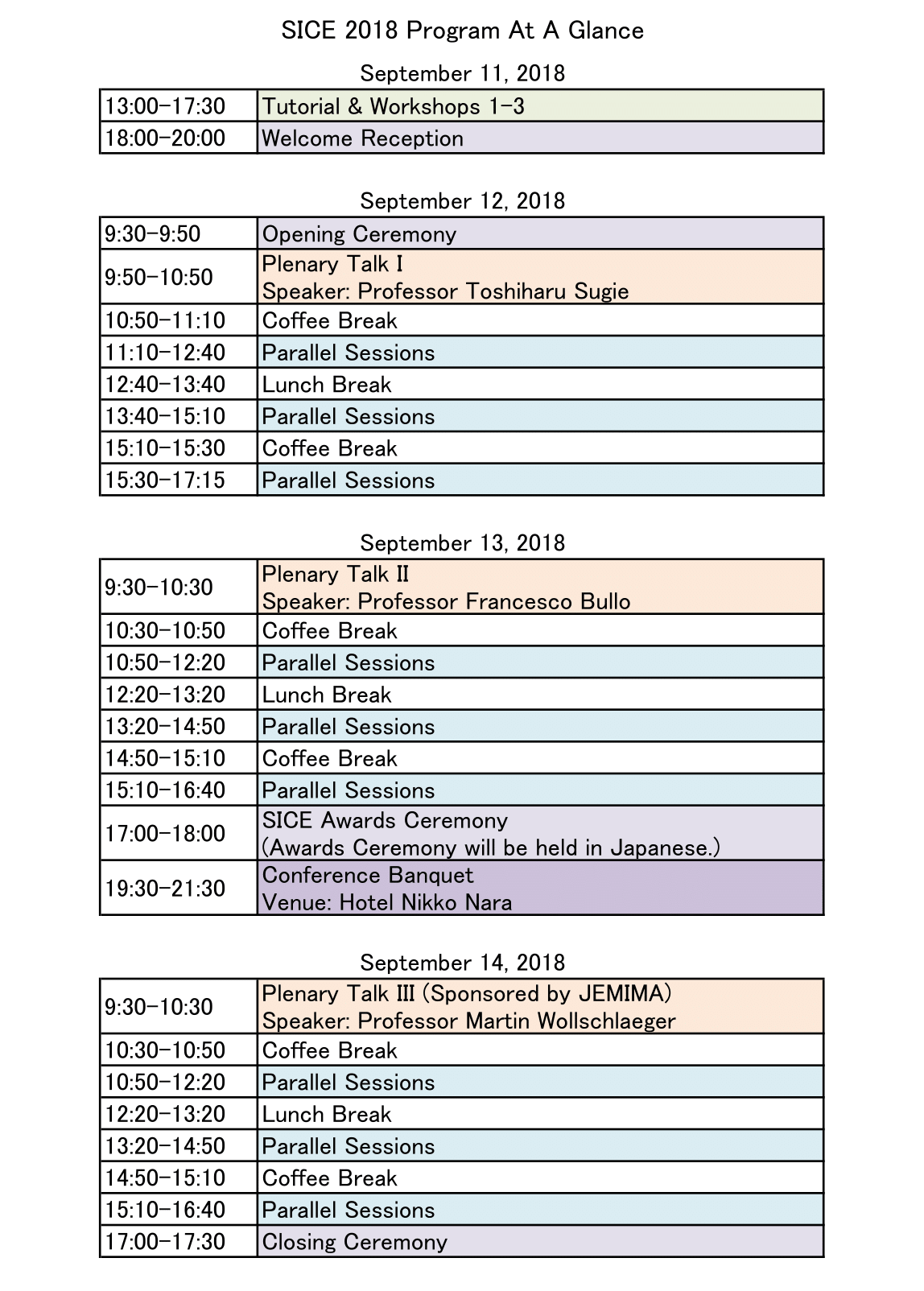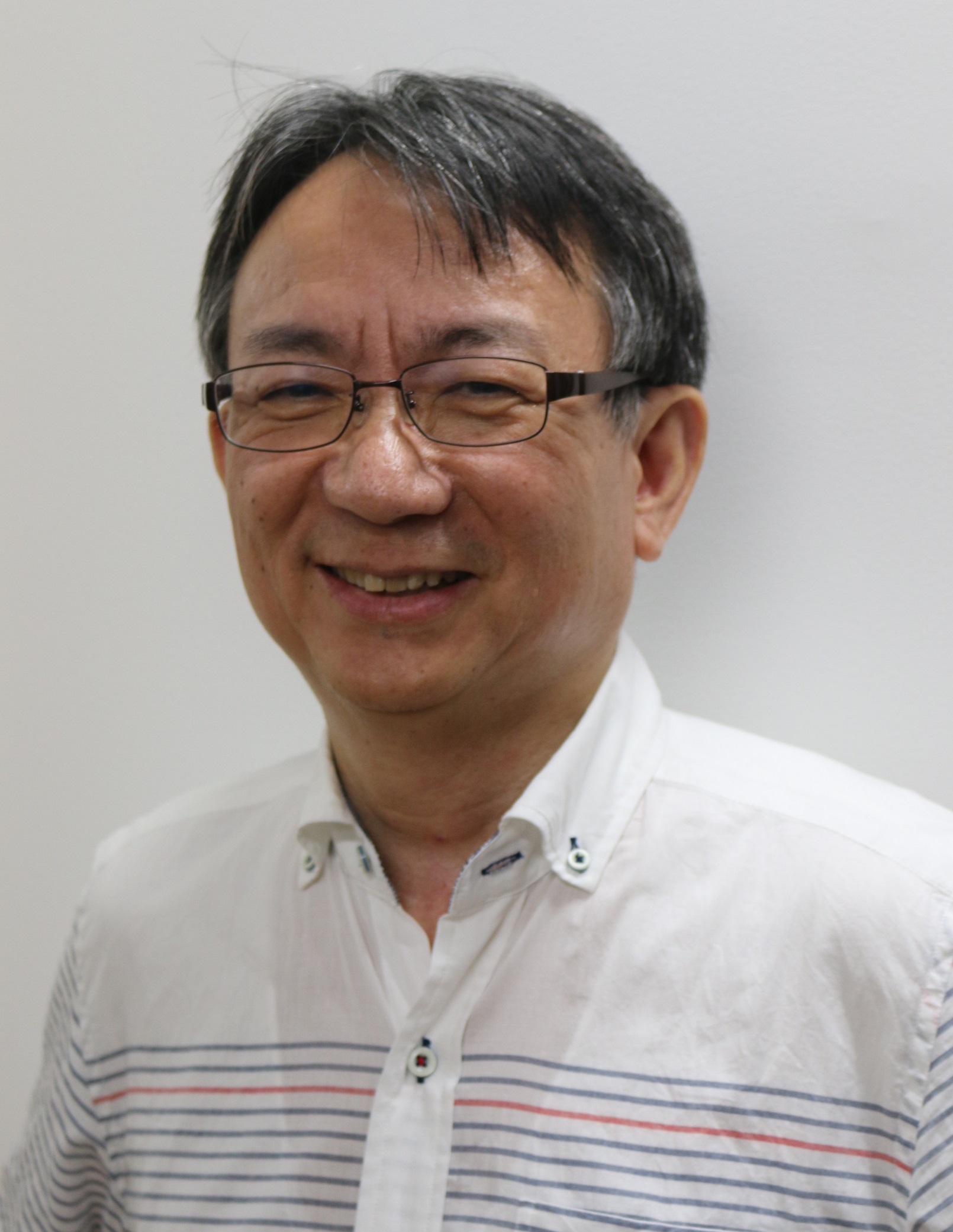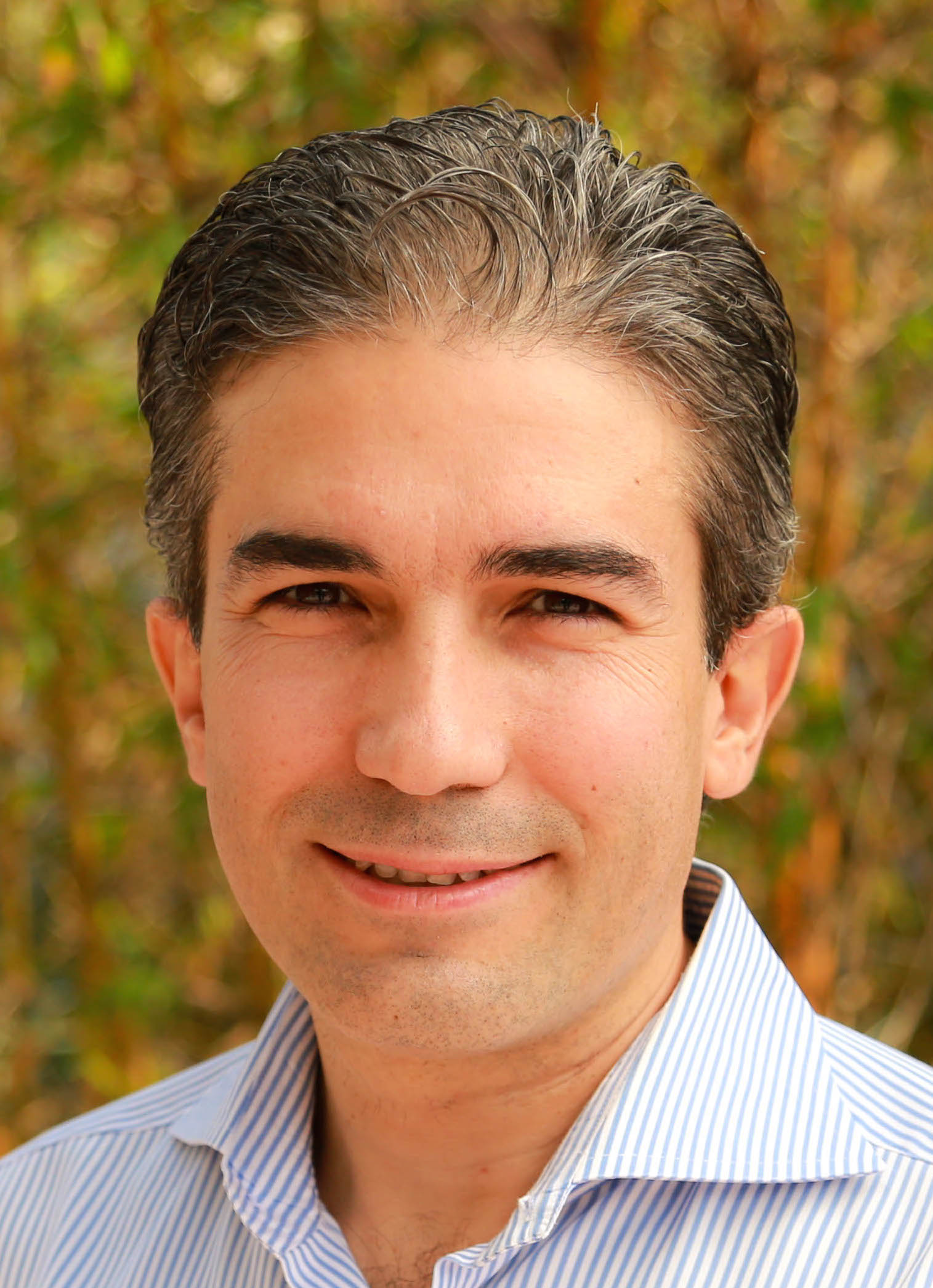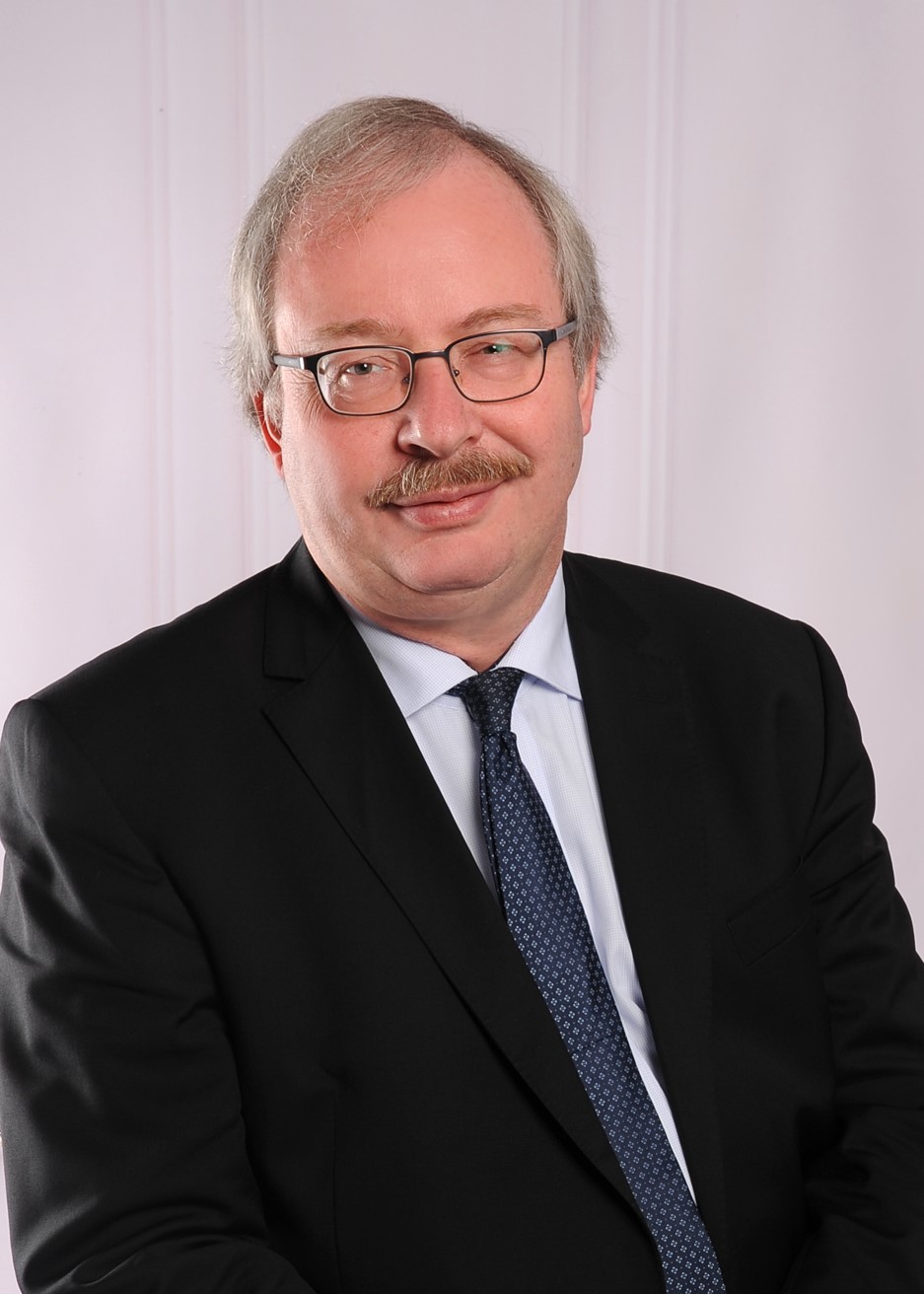Conference Program
Technical Program
The technical program can be found here.
Program at a glance

Plenary Talks
Plenary Talk I (Sep. 12, 2018)
Kernel Methods for Identification and Control
Kernel Methods for Identification and Control

Department of Systems Science, Kyoto University, Japan
Kernel methods, which play an important role in machine leaning, have attracted a lot of attention in the area of system identification recently. Once an appropriate kernel function is chosen, it is possible to obtain a fairly accurate finite impulse response model of the target system based on the short I/O data only. In this talk, first, we briefly explain about some basic properties about the kernel method. Then it is described how to exploit it for system identification, along with its connection with Bayesian estimation framework. Second, we discuss how to choose the good input for the kernel based system identification. Finally, it is pointed out that the kernel methods are useful for not only identification but also some control problems. Numerical examples are given to demonstrate the effectiveness of exploiting the kernels.
Toshiharu Sugie received the B.E., M.E., and Ph.D. degrees in engineering from Kyoto University, Japan, in 1976, 1978 and 1985, respectively. From 1978 to 1980, he was a research member of Musashino Electric Communication Laboratory in NTT, Musashino, Japan. From 1984 to 1988, He was a research associate of Department of Mechanical Engineering, University of Osaka Prefecture, Osaka. In 1988, he joined Kyoto University, where he is currently a Professor of Department of Systems Science. His research interests are in robust control, identification, and control application to mechanical systems. He was as an Associate Editor of several international journals, and served as an Editor for Automatica (2008-2017). He is currently Editor in Chief of Transactions of the SICE (Society of Instrument and Control Engineers). He was President of the ISCIE (Institute of Systems, Control and Information Engineers) in 2011, and a Vice President of the SICE in 2014-2015. He is a Fellow of SICE and IEEE.
Plenary Talk II (Sep. 13, 2018)
Network Systems and Kuramoto Oscillators
Network Systems and Kuramoto Oscillators

Department of Mechanical Engineering, University of California, Santa Barbara, USA
Network systems are mathematical models for the study of cooperation, propagation, synchronization and other dynamical phenomena that arise among interconnected agents. Network systems are widespread in science as fundamental modeling tools. They also play a key growing role in technology, e.g., in the design of power grids, cooperative robotic behaviors and distributed computing algorithms. Their study pervades applied mathematics.
This talk will review established and emerging frameworks for modeling, analysis and design of network systems. I will survey the available comprehensive theory for linear network systems and then highlight selected nonlinear concepts. Next, I will focus on recent developments on the analysis of security and transmission capacity in power grids. I will review the Kuramoto model of coupled oscillators and present recent results on its synchronization behavior.
Francesco Bullo is a Professor with the Mechanical Engineering Department and the Center for Control, Dynamical Systems and Computation at the University of California, Santa Barbara. He was previously associated with the University of Padova, the California Institute of Technology, and the University of Illinois. His research interests focus on network systems and distributed control with application to robotic coordination, power grids and social networks. He is the coauthor of “Geometric Control of Mechanical Systems” (Springer, 2004) and “Distributed Control of Robotic Networks” (Princeton, 2009); his forthcoming “Lectures on Network Systems” is available on his website. He received best paper awards for his work in IEEE Control Systems, Automatica, SIAM Journal on Control and Optimization, IEEE Transactions on Circuits and Systems, and IEEE Transactions on Control of Network Systems. He is a Fellow of IEEE and IFAC. He has served on the editorial boards of IEEE, SIAM, and ESAIM journals, and serves as IEEE CSS President in 2018.
Plenary Talk III (Sponsored by JEMIMA) (Sep. 14, 2018)
Smart Manufacturing — Smart Communications?!
Automation networks in the area of conflict between technological development and user requirements in industry
Smart Manufacturing — Smart Communications?!

Faculty of Computer Science, Technische Universität Dresden, Germany
Automation and control systems are affected by tremendous technological changes. The ongoing integration – or fusion – of operation and information technologies (OT and IT) will be an enabler for the introduction of new paradigms, with respect to both business-related and functional aspects. Flexibility and adaptability are in the focus, e.g. lot size one production and new value chains, as well as data-driven approaches and artificial intelligence in information processing.
Of course, this development requires communication between the various components in smart manufacturing systems. However, the communication solutions will evolve as well. Currently the use of dedicated solutions for communication in automation, like fieldbus systems and Industrial Ethernet or Industrial Wireless is state of the art, but it can be considered decreasing compared to the rising use of classical IT solutions and IoT technologies. At the same time, new stakeholders are entering the scene, covering roles ranging from connectivity and network providers up to those of the telecommunication companies.
Communication will play an increasing role in future production systems, but the way it will be recognized and managed will change. An abstraction will be necessary with respect to network functionality, enabled by concepts like Software Defined Networks (SDN). Besides flexibility in adapting the features and the specific configuration of a network, this abstraction will allow better coping with heterogeneous data transport systems, including 5G solutions. Middleware approaches and service orientation will strengthen this abstraction.
Seen from an end user's perspective, the specifics of a communication network shall be hidden; it shall simply fulfil his requirements. However, this calls for means of formalizing these requirements, e.g. as Quality of Service (QoS). This QoS information shall be the basis for negotiating Service Level Agreements (SLA) between the end user and a connectivity or network provider.
On the other hand, the technology developers and the providers shall be able to describe the features of their specific solution in a way that an automatic adaptation can be performed at runtime.
Based on three different scenarios from an Industrie 4.0 and CPS context, the talk discusses such requirements and related QoS. It reflects technological trends like TSN, SDN and 5G, discusses their potential usage in future industrial communication networks, and offers an outlook on the position of communication in industry, as well as on required topics for standardization in order to achieve the vision of smart manufacturing.
Martin Wollschlaeger studied Electrical Engineering at Otto-von-Guericke University Magdeburg, Germany. He received his Dr.-Ing. degree in 1991 and Habilitation degree in 2001 for research in automation and control system. From 2000 to 2003, he worked as a researcher at ifak Institute for Automation and Communication, Magdeburg. Since November 2003, he is full professor at TU Dresden, chair of Industrial Communications, and director of the Institute of Applied Computer Science, Faculty of Computer Science at TU Dresden, Germany.
His research topics are industrial communication systems and automation networks. This covers fieldbuses and industrial Ethernet as well as IP-based networks and 5G in industry. Special Focus is on information modelling, middleware concepts, management of heterogeneous networks, life cycle management, and semantic descriptions. The main goal of this work is to support and to enhance integration processes in manufacturing. Typical application areas covered by these activities range from dedicated communication technologies, engineering approaches, condition monitoring and predictive maintenance, up to CPS and CPS applications in Industrie 4.0.
Prof. Wollschlaeger is actively involved in standardization at ZVEI, VDMA, and DKE in Germany, and at IEC TC65 on topics of Industrie 4.0, Condition Monitoring, Predictive Maintenance, and Manufacturing Operations Management.
Prof. Wollschlaeger is author and co-author of more than 150 papers published in international journals and conference proceedings. For several years, he served as an Associate Editor of the IEEE Transactions on Industrial Informatics. He also works in several program and organizational committees of international and national conferences (including IEEE ETFA, IEEE WFCS, IEEE INDIN), and as reviewer for international and national journals (e.g. IEEE Transactions on Industrial Informatics (TII), Transactions on Industrial Electronics (TIE), atp). He is a member of IEEE, IEEE-IES, IEEE ComSoc, and IEEE Robotics & Automation Society.
Tutorial & Workshops
- Tutorial: Robust PID Control: Unified Model Reference Approach
September 11, 13:00-17:30 - Workshop 1: New Trends in Networked Control
September 11, 14:10-17:30 - Workshop 2: Cooperative Control for Energy Management Systems
September 11, 13:00-17:30 - Workshop 3: Integrated Design of Energy Management System and Vehicle System
– Joint WS of CREST EMS Suzuki Team and Control Theory Group of SICE
September 11, 13:00-17:30
Exhibitions
In Japan, Asia or all over the world, there are many companies, universities, and organizations, which are globally proud of their technologies and products. You can find such great exhibitors in the Reception Hall 1 from Wednesday, September 12th through Friday, September 14th.
The detailed information can be found here.
SICE2018 Special Event
SICE is aiming to realize “Society 5.0” by the cooperation of SICE's divisions. In SICE2018, SICE will hold special workshops introducing various technologies and theories and its activities for “Society 5.0” in order to promote academia-industry and cross-industry collaborations.
The detailed information can be found here.
Social Events
Welcome Reception
- Date: Tuesday, September 11
- Time: 18:00-20:00 (the doors will open at 17:30)
- Venue: Ristorante L' Orchestrata (located on the 1st floor of the conference venue)
Opening Ceremony
- Date: Wednesday, September 12
- Time: 9:30-9:50
- Venue: Noh Theatre at Nara Kasugano International Forum
Awards Ceremony
- Date: Thursday, September 13
- Time: 17:00-18:00
- Venue: Noh Theatre at Nara Kasugano International Forum
Conference Banquet
- Date: Thursday, September 13
- Time: 19:30-21:30
- Venue: Hotel Nikko Nara
The venue, Hotel Nikko Nara, is within a few minutes walk from the JR Nara Station. There are several bus services running from Kencho-mae Station to JR Nara Station. You can find bus schedules here.
Closing Ceremony
- Date: Friday, September 14
- Time: 17:00-17:30
- Venue: Noh Theatre at Nara Kasugano International Forum
Finalists of SICE Annual Conference Awards
(Awards Ceremony will be held in Japanese)
No show policy
No-show papers are defined as papers submitted by authors who subsequently did not present the paper in-person at this conference. Presentations by proxies are not allowed, unless explicitly approved before the conference by the program committee. No-shows will not be available on IEEE Xplore or other public access IEEE forums. No refund of the paid fees can be claimed by the no-show author.
Instructions for Oral Presentations
- The duration of a presentation slot is 15 minutes. Please notice that, in general, this includes 12 minutes for presentation and 3 minutes for discussions with the audience.
- Every session room will have an LCD projector and an electrical outlet (100V 60Hz, Type A). SICE 2018 will not provide laptops for presentation, i.e., YOU NEED YOUR LAPTOP FOR YOUR PRESENTATION. The connector from the LCD projector to your laptop is limited to a D-sub 15 pin male connection.
- No laser pointers are prepared in the rooms.
- It is highly recommended to show up in your session room 10 minutes before the session starts. You should test the connection of your laptop with the LCD projector.
Instructions for Poster Presentations
Poster Presentation Schedule
Date: September 13, 15:10-16:40Posters can be posted on the assigned board from 14:00.
Guideline of Presentation
- Your paper should fit within the following dimensions.

- Push pins will be provided to attach your posters to the boards.
- Please use any equipment for demonstration such as computers and robots at your own risk.
- Please avoid using any equipment that might cause problems such as noise and hazard.
Presentation Time
- The duration of the poster session is 45+45 minutes. During the session time, speakers are requested to make a presentation.
- All speakers are requested to put up posters before 14:55 on 13st September.
Instructions for Session Chairs
- In case you have not done pre-registration to SICE 2018, please complete on-site registration at least 30 minutes before your session. You will receive a few documents for chairing your session at Registration Desk. In particular, you will have a list of presentation records to be filled for your session.
- (IMPORTANT) Some of the documents including the list of presentation records are supposed to be FULFILLED AND GIVE IT TO THE REGISTRATION DESK after the session.
- Put your signature on the form.
- Check the box if presenter does not appear.
- Please appear at the session room at least 5 minutes before the session starts. Please confirm that all the presenters are in the session room.
- The duration of each talk is 15 minutes including discussions (about 12 minutes talk and a few minutes' discussions would be standard). Please indicate the elapsed time to the speaker appropriately and be punctual to the session schedule.
- In case of no-show, do not move to the next presentation. The session should be synchronized with all the presentations at other sessions.
